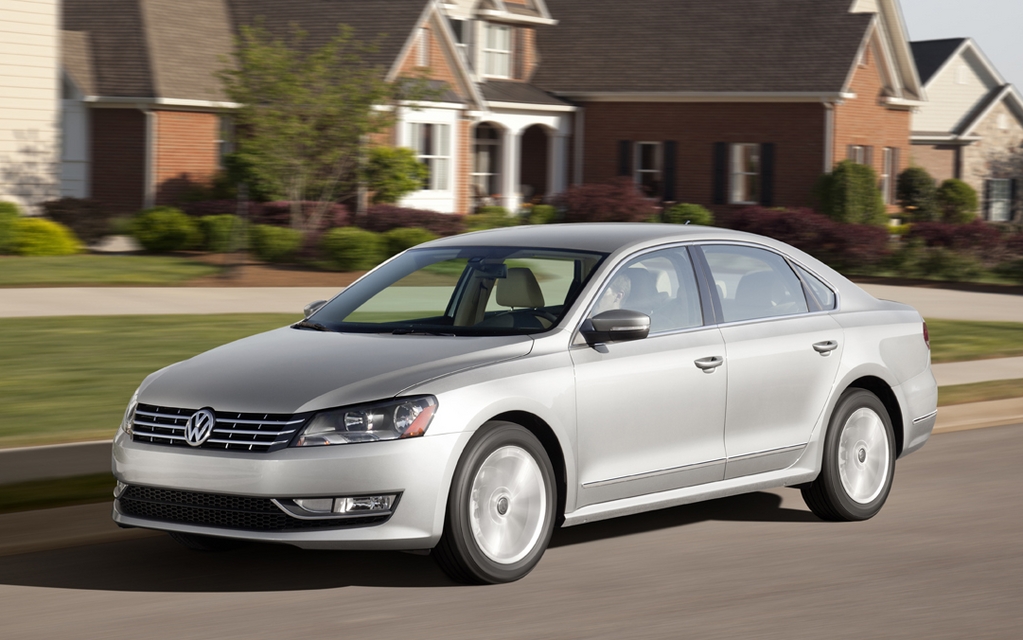2012 Volkswagen Passat: America or bust


Driven by its ambitions to become the world’s leading automaker, Volkswagen decided to do whatever it tales to dominate the main global markets, which will be key to its success. While the manufacturer has always been successful in Europe, the same cannot be said for North America. In fact, Volkswagen does fairly well here in Canada, but our neighbours to the south don’t seem to share our feeling for VWs. Not long ago, the new “Americanized” Jetta came on the scene, and now it’s the 2012 Passat’s turn to be sprinkled with American seasoning.
Recipe for success or beginning of the end?
You have to right to be suspicious when an automaker presents a new car, claiming that it has been tailored to American tastes. Does it mean that the new Passat has been stripped of anything fun, equipped with a marshmallow suspension, fitted for wide seats without any lateral support and enormous cupholders in the passenger compartment? Not exactly. It seems that the manufacturer exercised a little self-control, creating a product that comes closer to the unique characteristics of the North American market while keeping the car’s German essence.
Read also
Produced at the Volkswagen plant in Chattanooga, Tennessee, the 2012 Passat is intended to challenge countless mid-size sedans, including the Honda Accord and Toyota Camry, two models that are similar in size. However, the Passat has one thing its rivals don’t have: a diesel engine. Add to that an attractive base price and you get a new vehicle that will help the manufacturer reach its world domination ambitions!
Three engines, two interesting choices
The 2012 Passat comes in different versions, with equipment levels that feature varying levels of luxury. What distinguishes one version from another is primarily the engine. Offering a lower starting price than the competition meant equipping the base models with a 2.5-litre five-cylinder engine producing 170 horsepower and 177 lbs-ft of torque and paired with a five-speed manual gearbox, while the optional automatic transmission has one extra gear. It stands to attract a lot of attention from buyers, especially since this engine also appears in the more posh version, which gets you better equipment without having to bear the costs. Now that’s good thinking by VW.
The Passat TDI and its 2.0-litre 140-hp four-cylinder engine, which is also found in the Jetta TDI, is also sure to have its share of admirers. This engine comes standard with a six-speed manual transmission, while a dual-clutch automatic is available on option. However, the extra $4,000 that it costs will disappoint some.
Finally, the most luxurious trim levels come equipped with a 3.6-litre 280-hp V6 that is paired factory standard with a DSG gearbox, but we highly suspect that it won’t be the most popular version, most likely due to its price.
The 2012 Passat’s exterior has classic lines. Only the wheels make it a little more dynamic. Basically, the Passat isn’t going to turn any heads, but its level of sophistication is nice. This is a design that won’t lose its looks over the years and won’t go out of style too quickly. On the other hand, the North American touch is noticeable on this car: if it weren’t for the manufacturer’s logo, few people would associate it with a Volkswagen. It’s definitely going to take a little time to get used to it.
On board, it’s simple but very functional. The clear and well laid out instrumentation and the sport steering wheel that’s easy to get a feel for are delightful. Moreover, unlike some of its rivals, the Passat does not have a multifunction system that’s hard to master.
On the road
We test drove a version with a 2.5-litre five-cylinder engine with its unmistakable sound. Despite its 170 horses and the car’s size, you don’t get the impression that it’s underpowered. In fact, the opposite is true: we had to constantly check the speedometer to make sure we weren’t going over the legal limit. The main reasons for this are the excellent suspension that minimizes the road’s imperfections and the passenger compartment’s soundproofing that makes driving smooth and pleasant, even on long trips.
The Passat’s chassis is light and very rigid. You can’t call it a true sport sedan, particularly in the case of the 2.5-litre five-cylinder, but the car’s overall performance is relatively enjoyable. It’s a long way from the numbing performance of some Japanese rivals.
Basically, in a highly competitive segment where there are models for all tastes, the Passat holds its own. It seems that VW has done a much better job with the Passat than with the new Jetta. Its diesel engine gives it a large advantage, as does its superior warranty.








